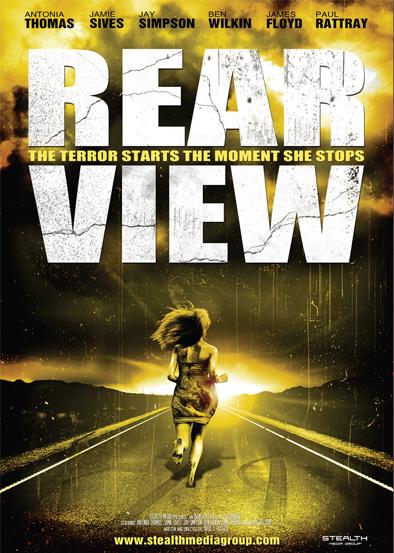★★
“With hindsight, I shouldn’t have bothered.”
 I must confess, I was perversely intrigued when I read a review on the IMDb, apparently from one of the directors, disowning this film: “Terrible, and despite it having my name on it, I had no say in the final cut.” While it is true to say that the synopsis – “Based on true events, a girl fights for her life on the Road – Tears Of Souls – chased by a gang of slave traffickers” – is almost entirely inaccurate, it’s not that dreadful. Oh, it’s… not good, to be sure. But I’ve seen worse (hello, Agent Jade Black): it’s not annoyingly dreadful, thanks mostly to a decent central performance by Thomas.
I must confess, I was perversely intrigued when I read a review on the IMDb, apparently from one of the directors, disowning this film: “Terrible, and despite it having my name on it, I had no say in the final cut.” While it is true to say that the synopsis – “Based on true events, a girl fights for her life on the Road – Tears Of Souls – chased by a gang of slave traffickers” – is almost entirely inaccurate, it’s not that dreadful. Oh, it’s… not good, to be sure. But I’ve seen worse (hello, Agent Jade Black): it’s not annoyingly dreadful, thanks mostly to a decent central performance by Thomas.
She plays Nicky, who is driving through the English countryside when her car stalls out, beginning an escalating series of misadventures. For this particular area is apparently ground zero for a series of mysterious disappearances of women, who subsequently turn up dead in what the police call suicide. Of course, that’s far from the case, with what appears to be a loose-knit collaboration between a pair of psychos (Sives and Simpson), predating the highways and byways out of a truck-stop, and certain elements of the authorities. Quite where the “slave traffickers” mentioned by the synopsis come in, escapes me entirely. To be honest, on reading that bit, I was expecting this to unfold in the middle East, rather than middle England.
Nicky is likeable enough and does, at least, appear slightly smarter than the average victim in these things. Or, at least, is not required to behave with the idiocy which is par for the course. However, the downside is that the sensible thing – staying locked in her car – is far from thrilling cinema. There is way too much sitting by the side of the road for this to work, even if you take into account the whole “being menaced by a pair of psychos” thing. Eventually, even they get bored with standing around, passing comment, and smash the side window, forcing Nicky out of her relatively safe-space and into the surrounding woods. From where there’s much running around, until we eventually circle back to the opening, in which she covers herself in fuel at an all-night petrol station, and threatens to set herself on fire after the cashier refuses to let her in.
There is only one scene which genuinely sticks in my mind, which sees Nicky strangle one of the people after her. It’s notable largely for the length, being an apparently endless exercise with the victim thrashing around in increasing desperation, trying to escape. The scene is nasty, brutal and tough to watch, which is exactly the way violence like this should be depicted. It also stands in sharp contrast to the pedestrian direction in the rest of the film, which contains little that is memorable or interesting. Maybe we Brits are just too gosh darned polite to do this kind of thing well?
Dir: Avril E. Russell, Orson Nava
Star: Antonia Thomas, Jamie Sives, Jay Simpson. James Floyd





 Megan Fox may not exactly be the first name which comes to mind when you think “battle-hardened mercenary leader.” But if you can get past your preconceptions, she’s definitely not the worst thing about this. We’ll get to what
Megan Fox may not exactly be the first name which comes to mind when you think “battle-hardened mercenary leader.” But if you can get past your preconceptions, she’s definitely not the worst thing about this. We’ll get to what  Wildlife photographer Harper Sykes (Dexter-Jones) is out in the wilderness of the “Watchatoomy Valley” [fictitious, but apparently located somewhere in the Virginias], when she stumbles across a group of men brutally attacking a victim. She snaps a few pics before fleeing the scene, but her attempts to report the incident to the authorities backfire immediately, and she quickly finds herself at the mercy of their leader, the appropriately-named Ravener (Longstreet). He explains the victim was a scout for big business, whose predations would destroy the natural environment, and so had to be stopped. Now, Harper is next in line. However, she is not the innocent and helpless victim they think. Even when she has the chance to escape, Harper decides to stay in the valley, and take vengeance on Ravener and the rest of his clan.
Wildlife photographer Harper Sykes (Dexter-Jones) is out in the wilderness of the “Watchatoomy Valley” [fictitious, but apparently located somewhere in the Virginias], when she stumbles across a group of men brutally attacking a victim. She snaps a few pics before fleeing the scene, but her attempts to report the incident to the authorities backfire immediately, and she quickly finds herself at the mercy of their leader, the appropriately-named Ravener (Longstreet). He explains the victim was a scout for big business, whose predations would destroy the natural environment, and so had to be stopped. Now, Harper is next in line. However, she is not the innocent and helpless victim they think. Even when she has the chance to escape, Harper decides to stay in the valley, and take vengeance on Ravener and the rest of his clan. Another example which illustrates the difference between Western and Japanese approaches to education. For here we have “Class Black”, a group containing a baker’s dozen of female pupils, eleven of whom have been tasked by a mysterious group to assassinate the twelfth, with the person who does it being given absolutely anything they want by the organizers. Yeah, it’s not
Another example which illustrates the difference between Western and Japanese approaches to education. For here we have “Class Black”, a group containing a baker’s dozen of female pupils, eleven of whom have been tasked by a mysterious group to assassinate the twelfth, with the person who does it being given absolutely anything they want by the organizers. Yeah, it’s not  This is certainly something of a novelty and/or a gimmick. But it’s none the less reasonably effective for it. Templeton – who is a woman, despite her first name, given to her after the character of Christopher Robin in the Winnie The Pooh books – suffered from polio as a young child. This left her with a badly damaged right leg; despite this, she pursued an acting career, and became a regular on soap The Young and the Restless for eight years. While I’ve seen a few disabled action heroes – Daredevil was blind – as far as disabled action heroines go, it’s basically her and Imperator Furiosa from Mad Max. And Charlize Theron wasn’t genuinely short an arm, so advantage Templeten. Though, sadly, she appears to have passed away in 2011.
This is certainly something of a novelty and/or a gimmick. But it’s none the less reasonably effective for it. Templeton – who is a woman, despite her first name, given to her after the character of Christopher Robin in the Winnie The Pooh books – suffered from polio as a young child. This left her with a badly damaged right leg; despite this, she pursued an acting career, and became a regular on soap The Young and the Restless for eight years. While I’ve seen a few disabled action heroes – Daredevil was blind – as far as disabled action heroines go, it’s basically her and Imperator Furiosa from Mad Max. And Charlize Theron wasn’t genuinely short an arm, so advantage Templeten. Though, sadly, she appears to have passed away in 2011. The action-heroine genre has seen its share of high-profile flops in the past. But this long-delayed entry, originally due out in February 2019, is among the worst, setting a record for the lowest ever opening at the North American box-office for a wide release. It took in only $2.8 million from 3,049 theaters when it opened in January, and ended with a worldwide gross below $6 million, against a budget of $50 million. While smaller in scale, that’s a
The action-heroine genre has seen its share of high-profile flops in the past. But this long-delayed entry, originally due out in February 2019, is among the worst, setting a record for the lowest ever opening at the North American box-office for a wide release. It took in only $2.8 million from 3,049 theaters when it opened in January, and ended with a worldwide gross below $6 million, against a budget of $50 million. While smaller in scale, that’s a  Nine years after the events of the
Nine years after the events of the  After a disease has wiped out all adults, the town of Potters Bluff has divided into two camps, delineated by the river running through the town. On the west are the Titans, a quasi-fascist order of jocks operating out of the old high school and led by Jeremy, whose motto is “Strength, power, respect.” On the east are the free-spirited remainder, living under and protected by Jack (Bourgeois). However, after hijacking the contents of a Titan truck, Jack is abducted by them and held hostage. A three-person party sets out on a rescue mission: Jack’s sister Nat (Iseman), her best friend – and painfully obvious lesbian, right down to the mohawk – Scratch (Kwiatkowski), and Sony (Friese), a former Titan who recently defected to the East, and whose inside knowledge is essential to their survival and the success of the mission.
After a disease has wiped out all adults, the town of Potters Bluff has divided into two camps, delineated by the river running through the town. On the west are the Titans, a quasi-fascist order of jocks operating out of the old high school and led by Jeremy, whose motto is “Strength, power, respect.” On the east are the free-spirited remainder, living under and protected by Jack (Bourgeois). However, after hijacking the contents of a Titan truck, Jack is abducted by them and held hostage. A three-person party sets out on a rescue mission: Jack’s sister Nat (Iseman), her best friend – and painfully obvious lesbian, right down to the mohawk – Scratch (Kwiatkowski), and Sony (Friese), a former Titan who recently defected to the East, and whose inside knowledge is essential to their survival and the success of the mission. Dear god, this is tedious. It takes forever for anything to happen, and when it does, the impact is less than overwhelming. Ronnie Price (Pearson, occupying territory somewhere between Angelina Jolie in Girl, Interrupted and Michelle Rodriguez) is a former GI, suffering from PTSD after three tours in the Middle East, who took to “self-medicating” herself with heroin in an attempt to deal with what she went through. This doesn’t do too much for her anger issues, and after one brush with the police, she’s made to choose between prison and a spell in a remote, women-only rehab facility. Reluctantly, she chooses the latter, though it’s not long before her PTSD flashbacks kick in, and threaten to make her stay a brief one.
Dear god, this is tedious. It takes forever for anything to happen, and when it does, the impact is less than overwhelming. Ronnie Price (Pearson, occupying territory somewhere between Angelina Jolie in Girl, Interrupted and Michelle Rodriguez) is a former GI, suffering from PTSD after three tours in the Middle East, who took to “self-medicating” herself with heroin in an attempt to deal with what she went through. This doesn’t do too much for her anger issues, and after one brush with the police, she’s made to choose between prison and a spell in a remote, women-only rehab facility. Reluctantly, she chooses the latter, though it’s not long before her PTSD flashbacks kick in, and threaten to make her stay a brief one. When I settled in to view this, I didn’t realize it starred Weaving, who was the best thing about the very entertaining
When I settled in to view this, I didn’t realize it starred Weaving, who was the best thing about the very entertaining